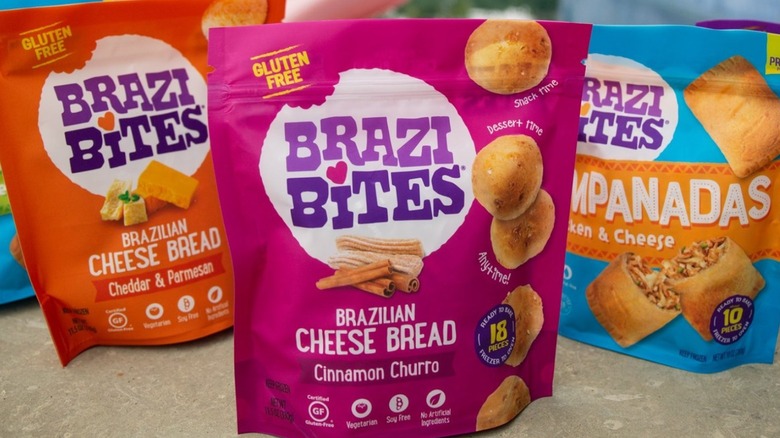What Happened To Brazi Bites After Its Shark Tank Appearance?
"Shark Tank" foods may come and go, but it looks like Brazi Bites, which was featured on the show in 2015, is here to stay. The company has a backstory that dates back to 2010, but has much longer roots if you consider the origins of its original product.
Brazi Bites is the name that Brazilian-born Junea Rocha and her husband Cameron MacMullin came up with for their version of what's known as simply "pão de queijo," or cheese bread in Rocha's native country. These small, chewy, round balls are standard-issue food fare in Brazil. They are common for breakfast and often served alongside a rich cup of Brazilian coffee, but they are also a typical snack food. What makes them especially seductive in today's market is that they are gluten-free, as they are traditionally made with yucca and tapioca flour (both common and inexpensive in Brazil), which provide an almost ethereally light texture to the cheesy bread mixture.
Rocha and MacMullin were both otherwise employed when they founded the business. Rocha was managing construction and her husband was working as an engineer. But the duo had a bigger dream, and after experimenting with a number of different recipes in their quest to replicate the golden puffs of deliciousness they loved, they finally baked up a winner.
Neither Julea Rocha nor Cameron MacMullin had a background in the food industry, so the duo enrolled in a class on "Getting Your Recipe to Market" at their local community college and Brazi Bites was born — though both Rocha and MacMullin kept their day jobs for several years.
Sharks take a (Brazi) bite
Their first big break came when their Portland Whole Foods "local forager" tried their bites and liked them. Getting into Whole Foods was a big win, but after several years, they still hadn't been picked up by enough stores to turn a profit. Rocha realized that even the enthusiastic customer response they'd gotten wasn't going to be enough; they needed a bigger strategy. Since launching, they'd expanded their presence to 700 stores, but Rocha figured that unless they could get into 2,000 stores, they wouldn't be profitable enough to survive. In short, they needed to go national. That's when they decided to audition for "Shark Tank." Despite the incredible competition, they decided to throw their hat in the ring, since it was a great opportunity for free exposure.
The duo was elated when they discovered that they'd landed a spot. Their appearance on Shark Tank in November 2015 was a truly decisive moment for the brand. As Rocha put it to CNBC, ″The 'Shark Tank Effect' is real! Within three days of airing, we were completely sold out of product in grocery stores nationwide. It was unbelievable. Viewers watched the show, went to the locator on our website, drove to stores, and bought Brazi Bites in the freezer section. And they bought all of it!"
Shark Attack was just the first wave
While the original deal Rocha and MacMullin made on "Shark Tank" with Lori Greiner fell through, Brazi Bites has been growing steadily since 2015. In the three years after their appearance on the show, the brand grew ten-fold, to 7,000 stores in the U.S. and Canada (including Costco), and revenue increased at an even greater clip, to $13 million. In the summer of 2018, they sold a majority stake to private equity, and later that year they appointed Mike Guanella as CEO .
The company's product weathered the pandemic well, too. While Brazi Bites has proven easiest to market at times of the year, like Christmas and Superbowl Sunday — when appetizers abound and gatherings are common — sales have remained steady, despite the economic ups and downs of recent years. And while the original cheese bread is still its focus, in 2019, the company decided it was time to launch a little something different, expanding its line to incorporate sweet churro-flavored Brazi Bites and mini empanadas in two different flavor combinations. The churro-flavored bites are a nod to the tremendously popular deep-fried dessert, and incorporate cream cheese and cinnamon sugar into the dough, but their smaller size makes them more snackable. The empanadas are a riff on the hugely popular hand pies found all throughout Latin America and come filled with cheese and chicken or black beans.
Brazi Bites has since grown even further, by expanding into both pizza and breakfast territory, two important sectors of the frozen food sector.
Pizza, breakfast, and beyond
Three flavors of Pizza Brazi Bites are availabe: four cheese, pepperoni, and supreme. The breakfast sandwiches take their inspiration from Brazilian "queijo queite" and come in four flavors: double egg and cheddar; bacon, egg, and cheddar; turkey bacon, egg, and cheddar; and turkey sausage, egg, and cheddar. The company continues to innovate; earlier this year, it added a twist to the original Brazi Bites by creating a variety covered in everything bagel seasoning.
Brazi Bites prides itself on containing simple, natural ingredients and "nothing artificial" in its products, reflecting traditional Brazilian recipes. The "bread" that inspired Brazi Bites has an interesting backstory, having originated in Minas Gerais during the colonial period when good quality wheat flour was hard to get and much of the population consisted of enslaved people. Local cooks used readily available cassava starch and later added cheese for flavor. The little balls of tapioca flour, egg, and cheese are easy and quick to bake since there is no rising time involved — and since they never included regular flour, there's no need to fiddle with the recipe for the gluten-free crowd.
Over the years, pao de queijo has become very popular throughout Brazil, and these days is easy to buy almost anywhere. While Brazi Bites are still not quite as ubiquitous in the U.S., the company's success has brought its products to many supermarkets across the country.
Junea Rocha and Cameron MacMullin's story is an inspiring model for entrepreneurs everywhere, especially those who miss the food from "back home" and decide to take matters into their own hands.



